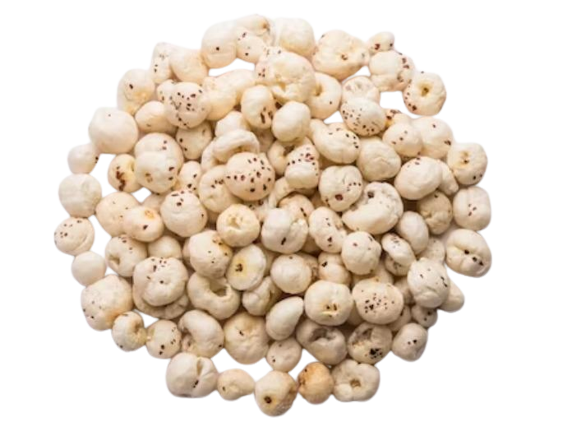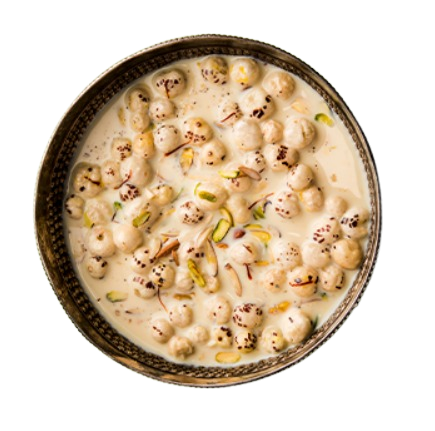
The Spiritual Importance of Makhana in Hindu Mythology.
Welcome to a fascinating journey into the world of spiritual foods, where we will be shining a spotlight on the divine significance of ‘makhana’ in Hindu mythology. For those who are hearing about makhana for the first time, it’s an edible seed that comes from the Euryale Ferox plant, a species of water lily. In English, it’s often referred to as fox nut or lotus seed, but its significance goes far beyond its culinary uses.
Makhana, like many other food items, holds a special place in religious practices. It’s not just about consumption — these foods carry deep spiritual meanings and are used in various rituals and ceremonies. Food, in many religions worldwide, serves as a tangible connection between the physical and spiritual realms, acting as offerings to deities, symbols of philosophical concepts, or tools for meditation and spiritual growth.
In this blog post, we will delve deep into the spiritual essence of makhana, uncovering its mythological origins and exploring how it is intertwined with the rich tapestry of Hinduism. Get ready to discover how a simple seed can possess such profound spiritual significance and learn about its role in rituals, symbolism, and the path toward spiritual enlightenment.
Mythological Uses of Makhana
Commonly known as fox nuts or lotus seeds, makhana is derived from the prickly water lily plant, Euryale Ferox. The process of harvesting this aquatic crop is laborious, making it a prized possession in ancient times. Many Hindu scriptures, including the Vedas and Puranas, reference makhana, indicating its widespread use and high regard in ancient India.
Moving beyond its earthly origins, makhana carries a profound symbolism within the tapestry of Hindu mythology. Its pristine white color and unique round shape, coupled with its nutritional richness, have led to it being regarded as a divine food item. Makhana is often considered a symbol of purity, fertility, and eternal life, resonating with the life-affirming teachings of Hinduism.

Moreover, makhana plays a significant role in the narratives associated with various gods and goddesses in Hindu mythology. For instance, it is closely associated with the Goddess Lakshmi, the deity of wealth and prosperity. According to legend, when the ocean was churned using the Mandara Mountain, Goddess Lakshmi emerged on a fully blossomed lotus, which is seen as a testament to the spiritual importance of lotus seeds or makhana. Furthermore, it is also linked with Lord Krishna’s child form, where he is often portrayed holding a handful of makhana, signifying his fondness for this divine delicacy.
In essence, the mythological uses of makhana extend far beyond its physical consumption. It serves as a vital link connecting believers to their deities, a symbolic offering that transcends the material world to reach the divine. Through understanding these mythological connotations, we can appreciate why makhana continues to hold a revered place in Hindu rituals and spiritual journeys even today.

Lotus Seed Symbolism in Hindu Mythology
As we continue our exploration into the spiritual and cultural significance of makhana, or fox nut, it’s essential to understand another aspect that enhances its importance in Hindu beliefs – its origin from the lotus seed. This seemingly simple seed carries within itself a universe of symbolism and significance in the rich tapestry of Hinduism.
The lotus seed, similar to the flower it births, is held in high regard within Hindu mythology. Its importance is rooted in the fact that it’s seen as a physical manifestation of divine beauty, purity, and spiritual awakening.
The lotus, after all, is a flower that blooms in the murkiest of waters, yet remains untouched by the impurity around it. Thus, the lotus seed becomes a symbol of the potential for spiritual growth amidst worldly challenges.
There are numerous mentions and references to lotus seeds in ancient Hindu scriptures. One of the most notable occurrences can be found in the Bhagavata Purana, a revered text in Vaishnavism, a major tradition within Hinduism. Here, the universe is described as a cosmic lotus, and its creator, Lord Vishnu, is often depicted seated on a lotus flower. In this context, the lotus seed is symbolic of the seed of creation, the divine potential within every being.
Lotus seeds play a substantial role in various religious rituals and practices. During puja, or worship, they are often used as offerings to the Gods, symbolizing surrendering one’s ego for spiritual growth. They’re also used during meditation practices, serving as a reminder of the divine within us, encouraging practitioners to strive towards enlightenment, just as the lotus blooms in adversity.
Furthermore, the lotus seed has a special place in ceremonies celebrating the birth of a child. It is customary in many Hindu communities to distribute sweets made from lotus seeds during such occasions. This practice symbolizes the desire for the newborn to grow with purity and spirituality, akin to the lotus flower that springs from the seed.
In essence, the symbolism attached to lotus seeds weaves a narrative of divine potential, spiritual awakening, and growth striving towards purity. The significance of the lotus seed augments the spiritual importance of makhana, reinforcing their key role in Hindu rituals and practices.
Makhana Usage in Hindu Pooja
Having delved into the rich symbolism of makhana and lotus seeds, we now turn our attention to the practical application of makhana in Hindu religious ceremonies and rituals, known as ‘pooja’. It’s fascinating how deeply integrated makhana is within these spiritual practices. The significance of this food item is not just theoretical or symbolic; it manifests tangibly in the rites and rituals of Hindu worship.

Makhana in Hindu Pooja
Makhana, due to its divine associations and symbolic meanings, holds an essential place in the execution of Hindu rituals. Whether it's daily worship or grand ceremonies, makhana often finds a spot on the altar. As we already know, makhana symbolises purity and spiritual growth. Its presence in pooja can thus be seen as an aspiration for these virtues in the worshippers' lives. Therefore, makhana in Hindu rituals is not just a food item but a spiritual tool.

Festivals and Occasions
A noteworthy aspect of makhana's usage is its prominence during special occasions and festivals. Particularly during fasting periods like Navratri or Ekadashi, makhana becomes a staple food due to its satiating nature and the belief that it embodies divine energy. It is also commonly used in the preparation of 'prasad' (a devotional offering shared among devotees) during these times, further underlining its spiritual importance.

Spiritual Significance & Symbolism
Incorporating makhana into rituals goes beyond mere tradition. It carries deep spiritual significance, serving as a physical manifestation of faith and devotion. When makhana is offered during pooja, it is believed to please the deities and bring blessings upon the devotee. The act of offering makhana can be seen as a symbolic surrender of the ego, acknowledging the divine power and expressing gratitude for life's blessings.
Meditative properties of Makhana
After understanding the role of makhana in Hindu poojas, it’s time to dive into another intriguing aspect—its meditative properties. Consider this: spiritual practices often incorporate elements designed to enhance inner peace and focus. In Hinduism, makhana is not only a food item for rituals but also a tool for meditation.

Makhana as a Calming Element
The calming influence of makhana is attributed to its inherent qualities. The simplicity of its taste, coupled with its light and airy texture, creates a sense of calm when consumed. It's akin to finding quiet in the chaos, a sentiment that resonates deeply with those seeking inner peace. This peaceful sensation makes makhana a fitting accompaniment to meditation and spiritual practices, where tranquility and focus are key.

Makhana and Meditation Practices
But how does one use makhana during meditation? To understand this, we need to appreciate the significance of food in spiritual practices. Eating is not just about nourishing the body—it's also about nourishing the soul. When we consume food mindfully, we create a deep connection with the earth, with life, and with ourselves. Makhana, being a product of nature, personifies this connection.
In many Hindu practices, makhana is used in ‘prasad’, a devotional offering shared among participants after the completion of a ritual. Consuming makhana as prasad becomes a meditative act itself, encouraging mindfulness and gratitude. It serves as a gentle reminder to appreciate the simple yet profound gifts of nature.
Achieving Mental Clarity with Makhana
Let’s delve deeper into the idea of mental clarity. Meditation aims to clear the mind of clutter, allowing us to focus on the present moment. The simple act of consuming makhana can aid in this process. When one eats makhana mindfully—savoring its texture, appreciating its taste, and acknowledging its origins—it becomes a form of meditation. This practice helps to quiet the mind, bringing about a sense of clarity and focus.
Moreover, makhana is rich in essential nutrients and has a low glycemic index, making it an ideal food for sustained energy. This steady energy can further enhance concentration during meditation sessions, supporting the journey towards mental clarity.
To sum up, makhana’s calming and meditative qualities go beyond its physical attributes. It serves as a bridge between the physical and spiritual, nourishing not just the body but also the soul. And while the experience of each individual may vary, the spiritual benefits of makhana in meditation are undoubtedly profound.
Makhana in Panch-Mewa and Panch Amrit
In the world of Hindu spirituality, two unique offerings hold a special place – Panch-Mewa and Panch Amrit. In Sanskrit, ‘Panch’ means five and ‘Mewa’ refers to dry fruits, together symbolizing the five essential elements of nature. On the other hand, Panch Amrit is a divine concoction made from five pure ingredients, each representing the fundamental aspects of life.
Interestingly, makhana, also known as fox nuts or lotus seeds, is an integral part of these offerings. As one of the ‘five sacred fruits’ in Panch-Mewa, it represents the element of earth, symbolizing stability, strength and abundance. Similarly, in Panch Amrit, makhana is often used as a substitute for banana to represent the earth element. Its inclusion in these offerings is not arbitrary but deeply embedded in the symbolic representations of life’s essentials.
The act of consuming makhana during these rituals holds profound spiritual significance. When devotees partake of the Panch-Mewa or Panch Amrit, they are believed to imbibe the divine attributes associated with each ingredient. The consumption of makhana, in particular, is considered to instill qualities such as resilience and grounding – traits that are embodied by the earth element.
Furthermore, it is worth noting that makhana is not just a nutritional powerhouse, but it also carries a spiritual potency. Consuming makhana during these rituals is akin to receiving prasad – holy food that has been offered to the deities. It is believed to purify the soul, clear the mind, and bring one closer to the divine consciousness.
So, as we delve deeper into the spiritual dimensions of makhana, it becomes evident how this humble ingredient transcends its culinary uses. Its presence in the sacred offerings of Panch-Mewa and Panch Amrit elevates makhana from a mere food item to a symbol of divine blessing and spiritual nourishment. Whether it’s about attaining mental clarity during meditation or seeking divine blessings through ritualistic consumption, makhana serves as a constant companion in the spiritual journey of a Hindu devotee.
Ritual Use of Makhana
Continuing our exploration of the spiritual importance of makhana in Hindu mythology, let’s delve into its role within Hindu rituals. Makhana, also known as fox nuts or lotus seeds, is not just a nutritious treat but also holds deep symbolic value in various ceremonial practices.

The Belief Behind Offering Makhana
The practice of offering makhana to deities stems from the belief that the gods and goddesses will be pleased by this humble yet sacred offering. It is thought that offerings of makhana could appease the divine entities and bring about blessings for good health, prosperity, and spiritual growth. This ancient practice also serves as a medium between humans and deities, facilitating a connection that transcends the physical plane. The devotees believe that consuming the prasad, which has been blessed by the divine, bestows upon them the deity's virtues and blessings.

Offering Makhana as Prasad
Within the tapestry of Hindu religious ceremonies, makhana often takes center stage as an offering or prasad. Prasad, derived from the Sanskrit word 'Prasada', means divine grace and is food that is first offered to deities and then distributed among devotees. One such example is the festival of Navaratri, dedicated to the Goddess Durga, where makhana is used in the preparation of prasad. The light, airy texture of makhana symbolizes purity, and its white color signifies peace and knowledge, aligning perfectly with the themes of spiritual enlightenment during this nine-day festival.
Cultural and Traditional Practices Surrounding Makhana
Makhana also plays a vital role in traditional practices within Hindu culture. For instance, during fasting periods like Ekadashi or Janmashtami, makhana is consumed for its high nutritional value and sustenance. The light and easy-to-digest nature of makhana makes it an ideal choice during these spiritual observances. Moreover, makhana is often used in the preparation of ‘kheer’ (a sweet rice pudding) during festivals like Diwali and Raksha Bandhan, adding a touch of tradition to the festive fare.
The use of makhana extends beyond being an offering to deities or a food item during fasts. It is also considered a symbol of fertility and longevity, often included in wedding ceremonies and rituals celebrating new beginnings. Its presence in such rituals is believed to bestow long life and prosperity on the participants.
Through the lens of rituals, makhana’s importance in Hindu spiritual practices becomes even more pronounced. As we have discovered, this humble seed holds a myriad of spiritual significances and is a testament to the rich tapestry of Hindu mythology and spirituality. As we conclude this section, we encourage you to explore further the multifaceted world of makhana and its profound spiritual implications.
Makhana’s Role in Hindu Spirituality
As we journey through the spiritual significance of makhana in Hindu mythology, we uncover layers of profound meaning and symbolism. Makhana, also known as fox nuts or lotus seeds, carries a rich tapestry of cultural relevance woven into the fabric of Hindu rituals, ceremonies, and religious practices. To recap, makhana is not merely a food item; it’s a divine symbol that holds a special place in the pantheon of Hindu spirituality.
The spiritual importance of makhana extends far beyond its role as a sustenance. It’s entrenched in the very essence of Hindu religious practices. From its presence in ancient Hindu texts to its association with gods and goddesses, makhana is a recurring element in the grand narrative of Hindu mythology. This humble seed is often seen at the heart of Hindu pooja, offered as prasad during various festivals, and consumed during fasting periods. Its uses are numerous, and its spiritual implications are profound.
But why does makhana hold such a central role in Hindu spirituality? The answer lies in its rich symbolism. Makhana, as a symbol of purity, peace, fertility, and longevity, resonates with the core tenets of Hinduism. It signifies a spiritual nourishment that feeds not just the body but also the soul. The sacred ritual of offering makhana to deities is believed to bring prosperity and good fortune, further spotlighting the spiritual significance of this lotus seed.
Moving beyond the rituals, makhana has also been recognized for its meditative properties. Its subtle crunch and calming qualities have been leveraged during meditation sessions to achieve mental clarity and focus. Consumed as part of Panch-Mewa and Panch Amrit, makhana continues to nourish spiritual seekers on their path towards enlightenment.
We invite you, our readers, to explore and experience the spiritual benefits of makhana in your own spiritual journeys. The mythological roots of makhana are deep and far-reaching, and its spiritual significance is vast. Whether it’s through incorporating makhana into your religious practices, using it as a calming aid during meditation sessions, or simply appreciating its symbolic meanings, there’s much to discover about this humble seed.
The exploration of makhana serves as a gentle reminder of the intricate link between food and spirituality in Hindu mythology. The journey we embarked on today has not only enriched our understanding of makhana’s spiritual significance but also underscored the broader spiritual importance of food in religious practices. So let’s celebrate and cherish the divine gift that is makhana, a simple seed with a profound spiritual impact.
Embrace the symbolism, experience the rituals, and immerse yourself in the spiritual essence of makhana. For in the world of Hindu spirituality, even the humblest of seeds can hold the deepest of meanings.